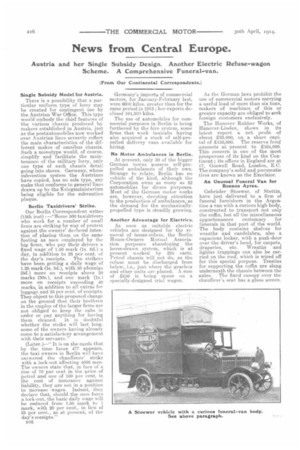News from Central Europe.
Page 20

If you've noticed an error in this article please click here to report it so we can fix it.
Austria and her Single Subsidy Design. Another Electric Refuse-wagon Scheme. A Comprehensive Funeral-van.
(From Our Continental Correspondents,) Single Subsidy Model for Austria.
There is a possibility that a particular uniform type of lorry may be created for contingent use by the Austrian War Office. This type would embody the chief features of the various chassis produced by makers established in Austria, just as the postautomobiles now worked over Austrian lines severely reflect the main characteristics of the different makes of omnibus chassis. Such a monotype would, of course, simplify and facilitate the maintenance of the military lorry, only one type of each chassis detail going into stores. Germany, whose subvention system the Austrians have copied, has no sole type, any make that conforms to general lines drawn up by the Kriegsministerium being eligible for the subvention plaque.
Berlin Taxidrivers Strike.
Our Berlin Correspondent writes (15th inst):—"Some 500 t,axidrivers who work for a number of small firms are striking by way of protest against the owners' declared intention of placing them on the same footing as men employed by the big firms, who pay their drivers a fixed wage of 1.50 mark (1s. 6d.) a clay, in addition to 25 per cent. of the day's receipts. The strikers have been getting a daily wage of 1.25 mark (1s. 3d.), with 50 pfennigs (6d.) more on receipts above 30 marks (30s.), and one mark (1s.) more on receipts exceeding 40 marks, in addition to all extras for luggage and 25 per cent. of receipts. They object. to this proposed change on the ground that their brethren in the employ of the larger firms are not obliged to keep the cabs in order or pay anything for having them cleaned. It is doubtful whether the strike will last long, some of the owners having already come to a satisfactory arrangement with their servants."
(Later.)—" It is on the cards that by the time Issue 477 appears, the taxi owners in Berlin will have answered the chauffeurs' strike with a lock-out affecting 4000 men, The owners state that, in face of a rise of 70 per cent in the price of petrol and one of 100 per cent. in the cost of insurance against liability, they are not in a, position to increase wages. Indeed, they declare that, should the men force a lock-out, the basic daily wage will be reduced from 1.50 mark to I mark, with 20 per cent., in lieu of 25 per cent., as at present, of the day's receipts."
D10 Germany's imports of commercial motors, for January-February last, were 6600 kilos. greater than for the same period in 1913 ; her exports declined 104,500 kilos.
The use of automobiles for commercial purposes in Berlin is being furthered by the hire system, some firms that work taxicabs having also acquired a stock of self-propelled delivery vans available for hiring.
No Motor Ambulances in Berlin.
At present, only 30 of the bigger German towns possess self-propelled ambulances of their own. Strange to relate, Berlin has no vehicle of the kind, although the Corporation owns as many as 52 automobiles for divers purposes. Most of the German motor works are, however, devoting attention to the production of a,mbulances, as the demand for the mechanicallypropelled type is steadily growing.
Another Advantage for Elertrics.
As soon as suitable electric vehicles are designed for the removal of house-refuse, the Berlin House-Owners Mutual Association purposes abandoning . the horse-drawn system, which is at present worked by 224 carts. Petrol chassis will not do, as the refuse must. be discharged from below, i.e., just where the gearbox and other units are placed. A SUM of £050 is being spent on a specially-designed trial wagon. As the German laws prohibit the use of commercial motors carrying a useful load of more than six tons, makers of machines of this or greater capacity are obliged to seek foreign customers exclusively.
The Hanover Rubber Works, of Hanover-Linden, shows in its latest report a net profit of about &:33,000, on a share capital of £150,000. The reserve fund amounts at present to £164,000. This concern is one of the most prosperous of its kind on the Continent; its offices in England are at 17, Goswell Road, London, E.C. The company's solid and pneumatic tires are known as the Excelsior.
An Unusual Funeral Van for Buenos Ayres.
Gebriider Stoewer, of Stettin, have just delivered to a firm of funeral furnishers in the Argon.tine a van with a curious high body, constructed to transport not only the coffin, but all the miscellaneous appurtenances customary for funerals in that part of the world. The body contains shelves for wreaths and candelabra, also a capacious locker, with a push-door over the driver's head, for carpets, draperies, etc. Wreaths and lighter trappings can also be carried on the roof, which is wired off for this special purpose. Trestles for supporting the coffin are slung underneath the chassis between the axles. The fixed canopy over the chauffeur's seat has a glass screen.
























